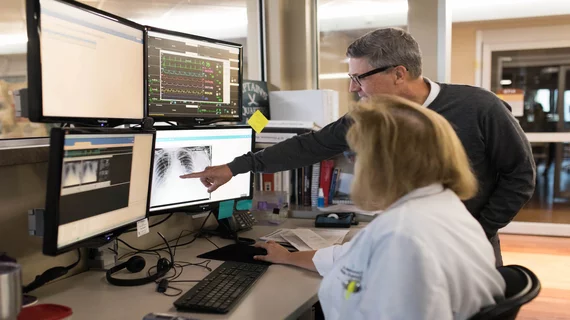How one health system reduced lengths of stay, slashed readmissions after heart surgery
Remote patient monitoring (RPM) programs can lead to significant improvements in patient outcomes after cardiac surgery, including shorter lengths of stay and reduced readmission rates, according to the experience of one North Carolina health system.
The team at Atrium Health’s Sanger Heart & Vascular Institute launched the Atrium Health Perfect Care Initiative in 2018 as a way to provide consistent, high-quality care for patients following major heart procedures. Patients are given a fitness tracker, scale and blood pressure cuff that are all connected to the smartphone application. These tools all track the patient’s recovery over time, and clinicians feel much more comfortable sending a patient home when they know they can still keep a close eye on their progress.
“When you see patients in the office, think of that like a photograph—one moment in time. But with this program it's more like we now have a movie of their postoperative course,” Kevin Lobdell, MD, a cardiothoracic surgeon at Sanger Heart & Vascular Institute, said in a statement. “This continuous monitoring helps us detect issues early and intervene before they escalate, which is a game-changer after surgery.”
“Patients often tell us that remote monitoring feels like having an extra set of eyes on them,” added Shannon Crotwell, RN, program coordinator for outcomes and care transformation at Sanger Heart & Vascular Institute. “It gives them confidence knowing that someone is always there to monitor their recovery and intervene if necessary. This level of support is invaluable, particularly during the vulnerable post-discharge period.”
The team shared data from the program’s first 1,000 patients in The Annals of Thoracic Surgery, the official journal of the Society of Thoracic Surgeons. All patients underwent coronary artery bypass grafting or heart valve surgeries from July 2019 to April 2023. Outcomes were compared with another 1,000 heart surgery patients treated within the same health system who were not enrolled in the Atrium Health Perfect Care Initiative.
Overall, patients enrolled in the RPM program spent approximately one less day in the hospital following surgery and had up to 40% fewer readmissions after 30 days. In addition, 97.8% of patients in the RPM program were discharged to home compared to 92.2% of those outside the program.
The team at Atrium Health is presently exploring data from the program as an attempt to eventually predict a patient’s potential for experiencing surgical complications. If they are successful, the belief is that they can treat these patients earlier if needed and plan ahead of time for any potential issues that may arise.
"Imagine being able to predict a patient’s recovery trajectory based on their sleep patterns or mobility data," Lobdell said. "This would allow us to intervene even earlier and tailor care to each patient’s unique needs, further enhancing outcomes and reducing the risk of complications."
Click here for the full analysis of the first 1,000 patients treated with this new RPM program.

